Florence, KY
General Dentistry in Florence, KY
Trusted General Dentistry Services in Florence, KY
What Dental Services Does a General Dentist Offer?
Your oral health care routine should include daily brushing and flossing, as well as annual or semi-annual visits to a general dentistry practice. Your dentist will help you manage your oral health, reduce your risk of diseases, illnesses, and other problems, and offer patient education. They evaluate, diagnose, treat, and manage all of your oral health care needs, including tooth and gum care, root canal therapy, dental fillings and crowns, and more. Our general dentistry team offers these key dental services:

When Should You Visit a General Dentistry Practice?
You should visit a general dentistry practices every year. Your dentist will do a full dental exam and may take dental X-rays. Depending on your risk level, they may also screen you for oral cancer, gum disease, or other oral health problems. They will give you thorough teeth cleaning and may recommend or perform additional dental services depending on your overall oral health, age, and lifestyle. Some people should visit their dentist twice per year if they:
- Are at a high risk of oral health problems
- Are receiving treatment for an oral health disease
- Getting multiple procedures done
- Are over 65 years old

Advantages of General Dental Services
General dentistry providers specialize in routine dental check-ups and examinations, interpreting the results of tests and x-rays, cleaning teeth and treating gums, and providing extractions, dental fillings, and emergency dental care. Visiting a general dentistry practice is like going to your primary care physician for health care services, except the treatments are focused on your mouth, teeth, gums, and jaw. Take a look at these advantages of general dental services:
- Enjoy access to multiple dental services in one office.
- Obtain education and preventive dental care to lower your risk of oral diseases, tooth decay, infection, and injuries.
- Find dental cavities and signs of gum disease before they get worse.
- Have damaged, decayed teeth repaired or extracted to avoid infection
- Get personalized dental services that make sense for your age, overall health, oral health, and risk factors.
- Improve your oral health and therefore your overall health.


